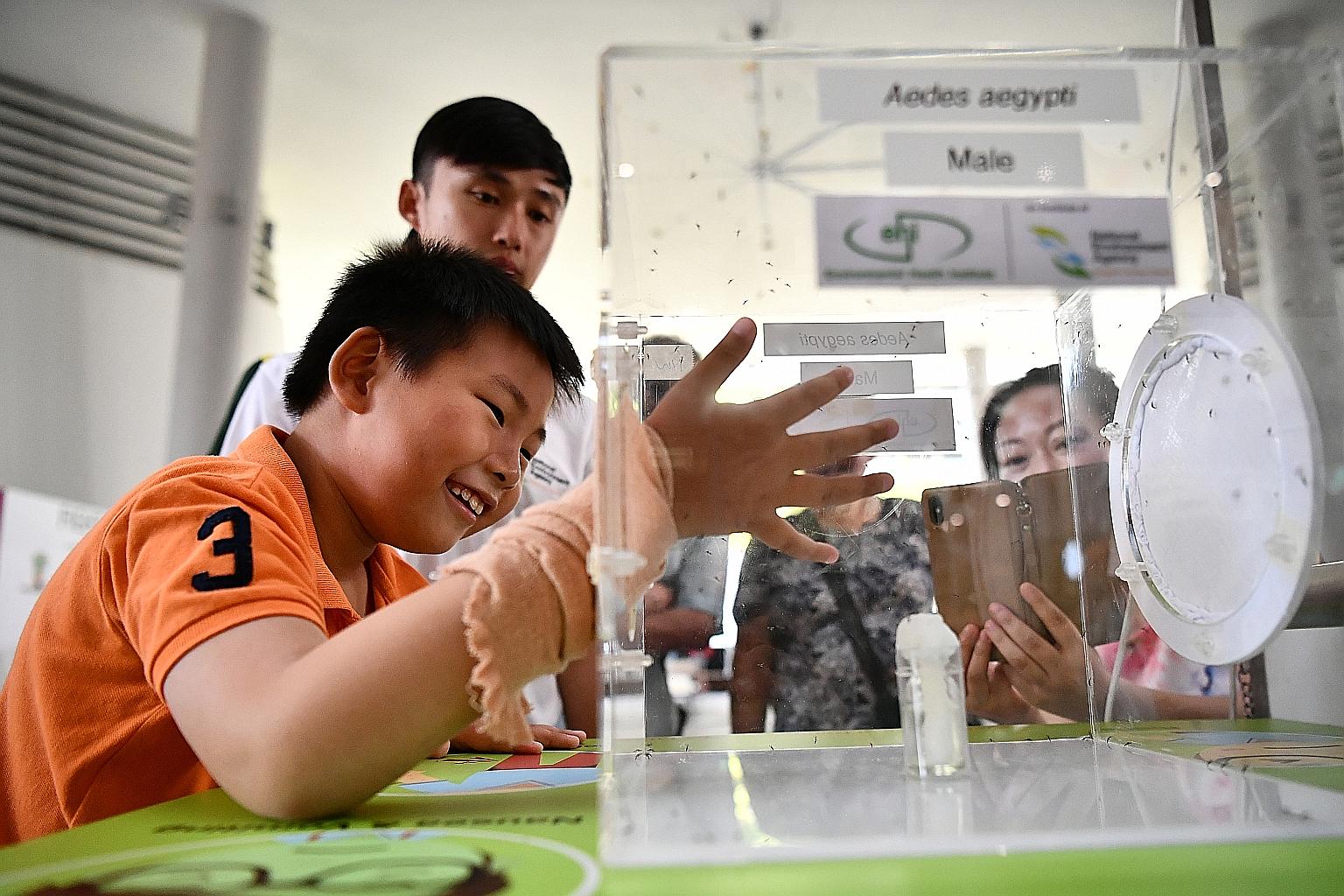Dengue campaign brought forward after more than 2,000 cases reported in first quarter
Over 2,000 cases in first three months; NEA expects number to go up in warmer months
Sign up now: Get ST's newsletters delivered to your inbox

Eight-year-old Lee Jia Hao putting his hand into a box containing male Aedes aegypti mosquitoes which do not bite, at a booth at the launch of the dengue prevention campaign yesterday. Sterile male mosquitoes are released under Project Wolbachia to control the mosquito population here.
ST PHOTO: LIM YAOHUI
The number of dengue fever cases in the first three months of this year has risen more than three times from the same period last year, prompting the early roll-out of an annual national dengue prevention campaign.
There were more than 2,000 dengue fever cases reported as of the end of last month, compared with 600 last year.
Three people have died from the disease in the first three months, up from one last year.
Minister for the Environment and Water Resources Masagos Zulkifli yesterday launched this year's dengue prevention campaign, which kicked off in mid-May in the past two years.
The annual campaign is held ahead of the peak dengue period from June to October.
"In Singapore, dengue continues to be an ongoing threat," Mr Masagos said. "The effects of climate change, where the temperature is expected to rise, are going to exacerbate the challenge."
The National Environment Agency (NEA) expects dengue cases to increase in the warmer months ahead, unless steps are taken to keep the mosquito population in check.
There were 2,772 dengue cases in 2017 - the lowest figure in 16 years. The number increased by 20 per cent last year to 3,285.
Nonetheless, the figures of the past two years were far lower than those of preceding years. Between 2013 and 2016, the annual total number of cases exceeded 11,000.
Currently, mosquito traps which capture female Aedes aegypti mosquitoes and their eggs - called Gravitraps - are deployed in HDB estates, giving the NEA an overview of mosquito population density in various parts of Singapore.
This has helped the agency remove 21 per cent more breeding habitats last year, compared with 2017, when the traps were introduced.
Gravitraps will be deployed at new HDB blocks and landed housing estates in the second half of this year. About 14,000 more traps will be set up this year, adding to the current 50,000 traps.
Phase Three of Project Wolbachia, which releases sterile male mosquitoes to control the mosquito population, has also started.
In earlier studies, the Aedes mosquito population decreased by 80 per cent in Nee Soon East and by 70 per cent in Tampines West.
The NEA conducted nearly one million inspections last year and uncovered about 18,000 mosquito breeding habitats, said Mr Masagos, who spoke at Kampung Admiralty. About 224,000 inspections have been carried out from January to last month, according to the NEA.
Community vigilance is critical to dengue prevention, Mr Masagos told residents. "To win the war on dengue, we need everyone to be vigilant," he said.
He encouraged residents to remove stagnant water in their homes and also to pay attention to common breeding spots such as pails, dish trays, flower pot plates and vases.
Admiralty resident Nasyrul Hairuldyn, 25, and his family have been conscientiously taking these steps in their five-room flat since one of his sisters contracted dengue two years ago.
The family of eight even invested more than $50 in an electronic pet feeding bowl that keeps water inside running to prevent mosquito breeding.
"We do our part at home to feel a bit safer," said the IT specialist.


